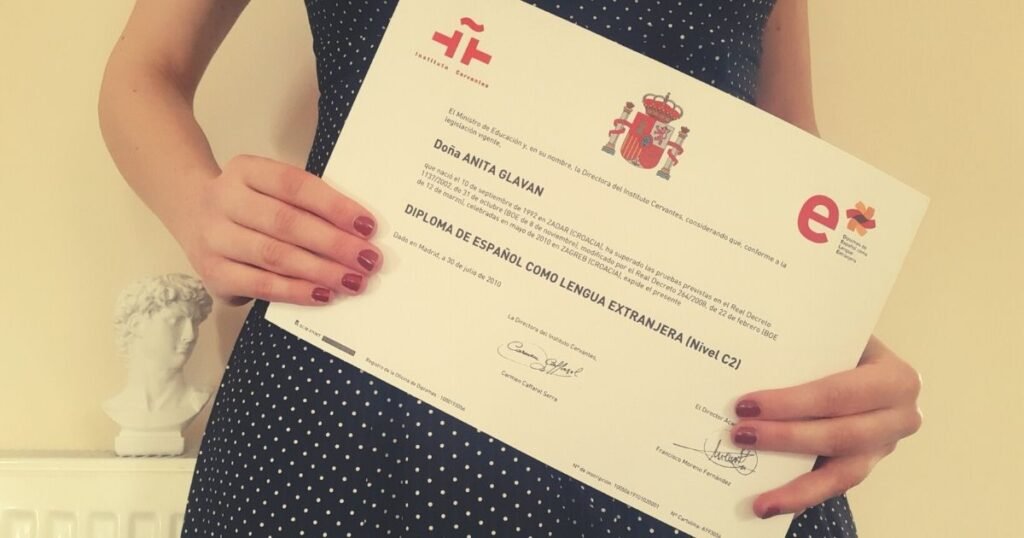In this post we will bring you the detailed breakdown of everything you MUST know in order to triumph at DELE exam.
Have you been studying Spanish for a little while and feel like you’d like to challenge yourself more? Maybe you’re self-taught or taking a course but would like your hard work to be universally acknowledged? Or you’re about to take on a new job or a scholarship and DELE is that last step in obtaining it?
Then this article is for you! Written by a Spanish teacher of many years and a DELE C2 Master, we will familiarize you with this globally renown Spanish exam and bring you our top advice and tips to pass it with flying colours.
WHAT IS DELE?

For starters, DELE stands for Diploma de Español como Lengua Extranjera (Diploma of Spanish as Foreign Language).
DELE is an universally recognized title of Spanish proficiency. Simply put, this means that DELE is accepted at every school, university, workplace, and institution in the world as firm proof of your knowledge of Spanish. If you want to study or work anywhere in the Hispanic world, you will need DELE.
There are six different levels you can take, because DELE exam is based on the Common European Framework of Reference for Languages. If you don’t know what that is, don’t worry, as we have a detailed overview of that on our website.
In order to fully understand the weight of the DELE diploma and its numerous benefits, it’s important to know who’s behind it.
So let’s have a look.
WHO COMES UP WITH THE DELE EXAMS?
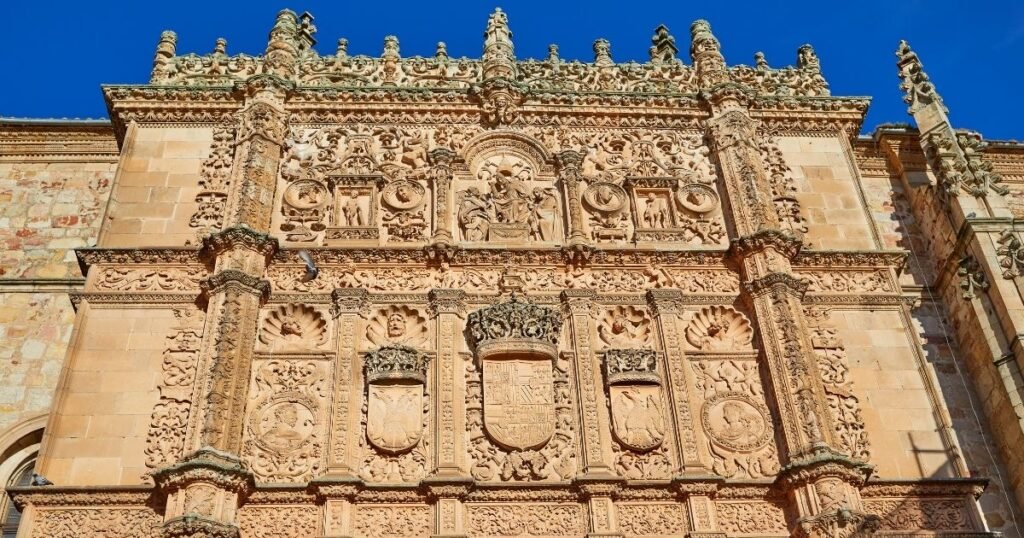
Most people aren’t aware that the DELE exams are made and evaluated at Salamanca University
DELE is the joined work of three major Spanish institutions:
- University of Salamanca designs the exams and is in charge of corrections and the final evalutation
- Instituto Cervantes organizes examination sessions
- Diploma is granted by Spain’s Ministry of Education, Culture and Sport
However, most people taking the DELE exam aren’t aware of where the exams are made and evaluated.This is mostly due to the fact that the only insitution they will deal directly is Instituto Cervantes.
So let’s see why this institute is so vital for Spain and Spanish language.
INSTITUTO CERVANTES − WHY EVERY SPANISH STUDENT KNOWS ABOUT IT?
If you’re learning Spanish, you’ve probably heard at some point of the Instituto Cervantes. Its mission is to spread the love and knowledge of the Spanish language and Hispanic world.
It was set up in 1991 by the Spanish government to promote the teaching and study of the Spanish language and culture and it’s done so exceptionally well since then. As you can guess, it was named after Miguel de Cervantes, the author of what it is considered to be the first modern novel ever, Don Quixote.
Its Spanish headquarters are in Madrid and Alcalá de Henares but Instituto Cervantes is not limited to Spain. As a matter of fact, it’s established in 88 towns in 45 countries over 5 continents.
To name just some of the functions and features of the Instituto Cervantes:
- offers Spanish language courses: general and specific (for medical, legal purposes,etc.)
- develops Spanish learning methods
- hosts Aula Virtual de Español (Spanish Virtual Classroom)
- sponsors lectures, book presentations, concerts, art exhibitions, The Spain Film Festival and Festival of Flamenco
- establishes libraries and other international language centres
- publishes the Anuario del español to keep track of the development of the Spanish language
- supports Centro Virtual Cervantes since 1997
With so many crucial roles, it’s no surprise that Instituto Cervantes also offers DELE preparatory courses, and more importantly, it organizes and hosts DELE exams as well.
Therefore, the first step in taking the DELE exam is to get registered on the Instituto Cervantes website − in Spanish only. We have covered the topic of registration process more in depth in our Guide to DELE 2022 article.
We are also sharing with you this short video clip brought to you by the Instituto Cervantes where, en pocas palabras, they present DELE to you:
IS DELE THE SPANISH IELTS? YES AND NO
As was said in the video, DELE really does open many doors for you. Comparatively, DELE is for the Spanish speaking world what IELTS is for English.
Nowadays, it’s almost unimaginable going to an English speaking country for work or study without taking the IELTS exam. The same thing applies for DELE, only DELE doesn’t have an expiration date.
In that regard, DELE is more like Cambridge English Language Assessment − the structure and the principle of the test are more similar as well. Therefore, DELE is like IELTS in terms of practical importance, but more like Cambridge when it comes to the structure.
Additionally, bear in mind that you will probably wait longer for DELE results than you would for IELTS. It can take up to a couple of months for the tests to be evaluated and marked at the University of Salamanca.
However, the time and the wait are worth it for the globally recognized and lifelong proof of your knowledge of Spanish!
HOW DO I PREPARE TO TRIUMPH AT DELE?
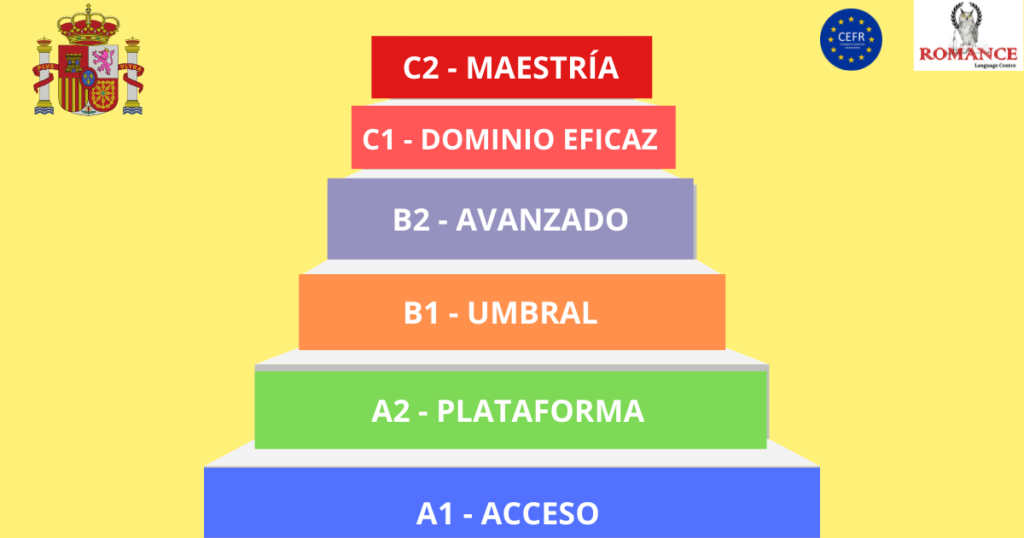
As always, the first thing you need to do is determine the level you wish to take.
Remember, DELE is an independent diploma so the levels aren’t consecutive. This means that you can apply for any level and your learning background doesn’t matter either. You can be self-taught and apply for C2 DELE.
However, I would advise you to be sure of the level you are at before registering for the exam, as you need to pay for it. The higher the level, the bigger the cost. You can read what’s expected of you at each level in our depiction of the CEFR:
Here is some general guidelines to bear in mind about DELE levels:
- if you’re applying for the Spanish citizenship, you will need the A2 level.
- if you need DELE for work and studies, level B2 will usually be the required level.
- DELE C2 tends to be a lot more difficult than DELE C1.
As you can imagine, obtaining C1 and C2 levels is more challenging and not many people talk about the fact that DELE C2 tends to be a lot more difficult than DELE C1. They’ve reduced the gap between the two levels in the recent years, so take that into account when sampling the old tests that are still available online.
If you’re unsure about your level, you can take this prueba de nivel through Instituto Cervantes.
We have also built tests for our students to test their Spanish level following Instituto Cervantes guidelines and our courses’ structure. You can take our tests here.
WHERE CAN I PREPARE FOR DELE?
As you can imagine, there are many language centers out there offering DELE preparatory courses. In the same way you can either do the IELTS preparatory course at the British Council or in a language school, you have the option to do the same at the Instituto Cervantes.
But what if you live in a town where there’s no Instituto Cervantes and no language center offers such specific courses?
I personally come from a small town, and when I was studying for my DELE C2 diploma, there was nowhere I could take the course.
One thing you can do is to take the online course through Instituto Cervantes. For more information on Instituto Cervantes preparatory courses, visit here.
However, my solution for that was to take private lessons with a qualified University lecturer. In retrospect, I believe that was the best thing I could have done and let me explain why.
WHAT’S GREAT AND WHAT’S NOT SO GREAT ABOUT PREPARATORY COURSES
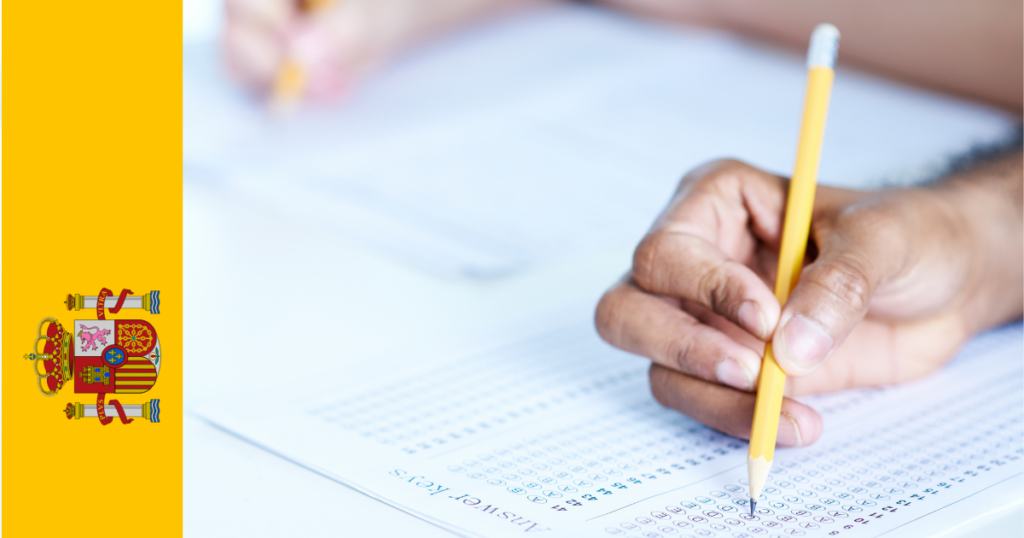
In my life, I have taken and given a lot of exams, including IELTS and Cambridge tests through the obvious route − the preparatory course for the respective exam. And yes, those courses are great for getting you familiar with the structure of the exam and giving you some useful tips.
However, their main focus is not so much the language itself, but the exam.
Surely you will learn about different aspects of grammar along the way, but that won’t be the main focus. The main goal is to get the process of solving the exam automatized for optimum results.
We’re not saying that preparatory courses are bad, we’re saying that you shouldn’t be only doing the course.
Instead, you should continue studying the language as you usually would, by reading a lot and studying the structure of the language, not just the structure of the exam. Specialized books, online tests and preparatory courses are not there to teach you the language: they’re there to prepare you for the exam.
Personally, I studied for a year and a half with my tutor and she used both specialized DELE exam books and standard materials. This included textbooks, articles, movies in Spanish (and writing reviews about them), essays, books, etc.
PREPARATORY COURSES HAVE BENEFITS
That being said, there’s no doubt that it’s important to get familiar with the layout of the exam. Exams are stressful as it is, so knowing what everything will look like on the day and what to expect is essential.
Preparatory courses are also there so that you wouldn’t make a silly mistake, such as writing the answers where you’re not supposed to, or not writing them at all, etc. That could affect your score badly, and not due to your language skills!
If you are interested in individual DELE exam preparations, Romance Language Centre offers a 1-2-1 preparatory course led by a Spanish teacher, lecturer and DELE C2 Master. We tailor lessons to your needs and goal, with consistent and regular feedback aimed to prepare you for the exam in the optimal amount of time and to develop the 4 main skills: reading, listening, writing and speaking.
Additionally, we work with students to discover and cover all possible gaps in knowledge. We also provide educational assessment, and hands-on experience from DELE C2, from the registration process, structure of the exam and multiple firsthand tips and tricks. You can contact us here for more information on our preparatory DELE 1-2-1 course.
AN ASPECT OF DELE NO ONE TALKS ABOUT
If you’re taking a language exam, it’s safe to assume that it’s your linguistic abilities that will be put to test. Or is it?
One thing I’ve noticed about DELE, more so than with any other exam, is that it’s not always just about your knowledge of the language. At C2 level, at least, the answers in the reading part are often very ambiguous.
However, this isn’t due to grammar, but to the context itself.
You need to know Spanish well to understand the nuances but, often times, you will have to deduce the correct answer by using logical intelligence, not your knowledge of Spanish. This is because sometimes more than one answer is correct, but one answer is more correct than the others, and that is the right answer.
Sounds like a nightmare? It is.
But don’t worry,, our pre-recorded DELE course is in the making and will be available soon. In it, we will tackle all the problematic and challenging aspects of DELE and everything else you need to know to not only pass the exam, but exceed your own expectations.
In the meantime, we’re bringing you some popular textbooks to help you triumph at DELE.
BEST MATERIALS TO PREPARE YOU FOR DELE
1. CRONÓMETRO
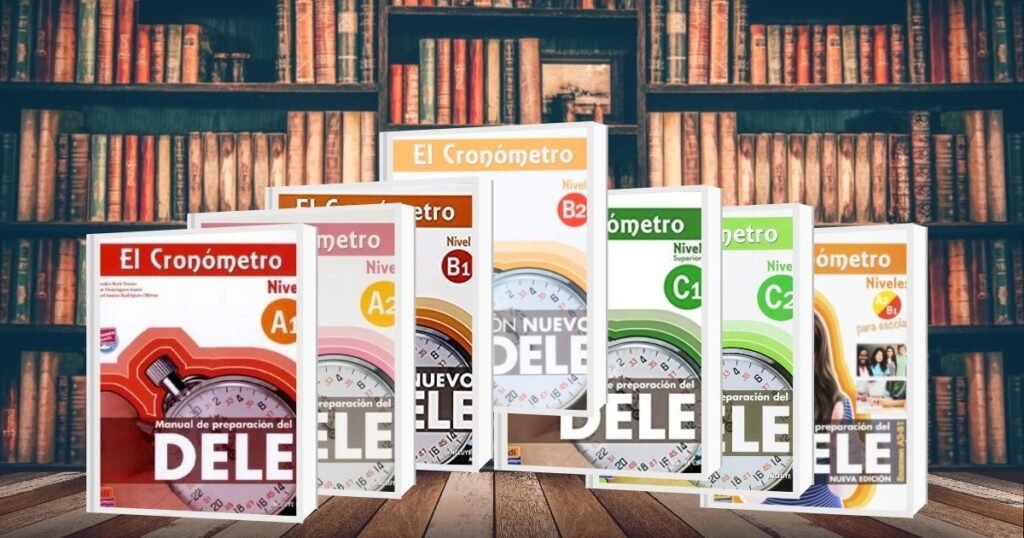
This is a great book to get ready for your DELE exam and the one that I personally used.
It opens with FAQ (Frequently Asked Questions), answering questions like – is it bad if I speak Mexican Spanish, do I need to speak like a native to pass the exam, etc.
It then lets you find the answer in the text below. That text is your guideline. In addition, you will familiarize yourself with the structure of the exam and the duration of each section.
On the side note, I highly recommend that you bring a wrist watch to the exam.
Even thought there should a clock in the room, you don’t know what your sitting arrangement will be and if you will be facing the opposite side. This happened to me and I was grateful for my wrist watch during the written part of the exam.
This book comes with little tips and warnings like that. It also tells you to, for example, consult Método or Prisma textbooks for certain grammar rules. After the introductory part, you will go through a series of tests just like you would at the DELE.
All in all, we highly recommend this series.
2. LAS CLAVES
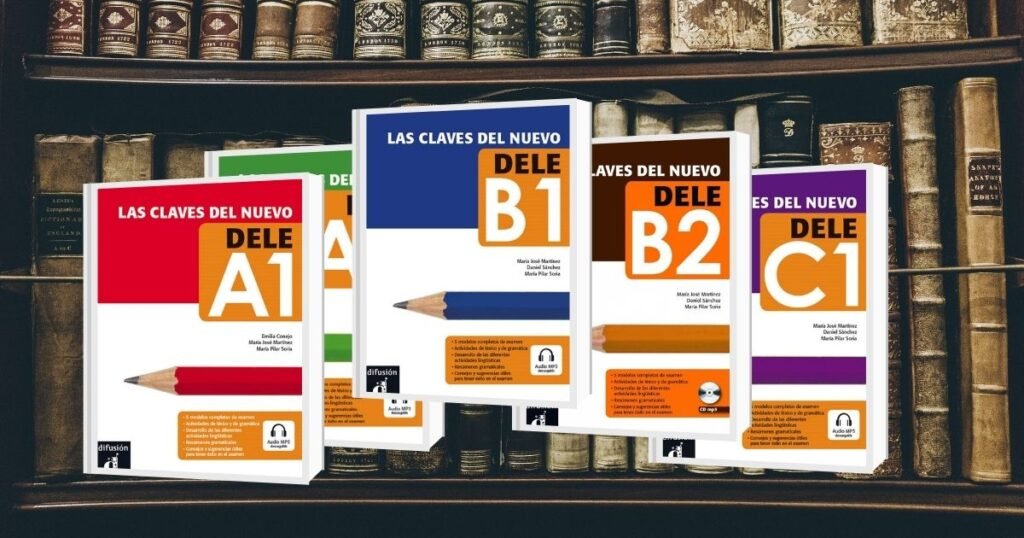
This textbook is great if you feel like your vocabulary is lacking.
It brings you the standard DELE exam models that consists of writing, speaking, reading and listening part. Therefore, it’s good for the exam drill but it also has a separate section for vocabulary. For example, it will give you suggestions for describing the person, what verbs to use, etc. Just like Cronómetro, it gives you recommendations for books you should consult in addition.
3. USO INTERACTIVO DEL VOCABULARIO
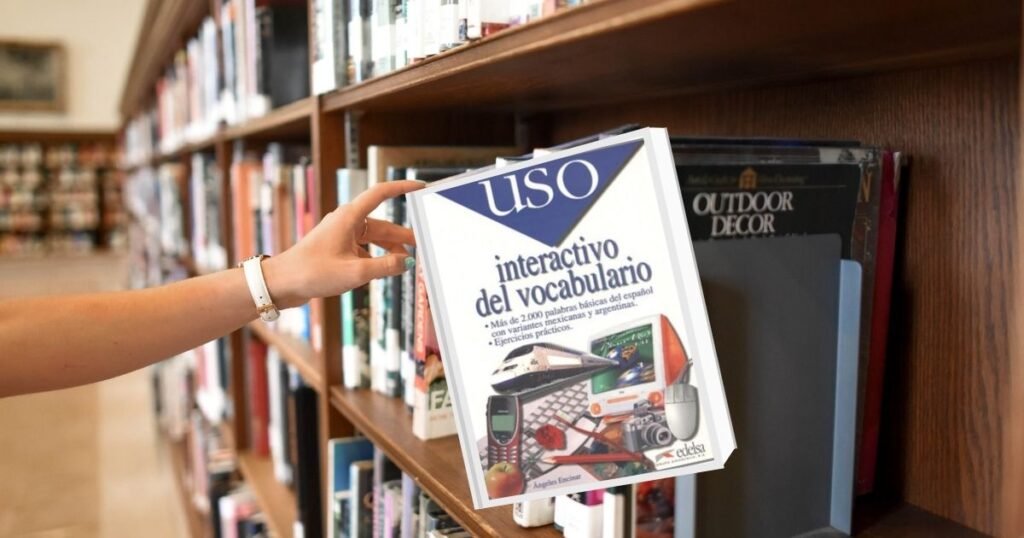
If you’re taking a Spanish course, your textbook surely comes with different sections dedicated to expanding your vocabulary.
When studying for a highly regarded diploma, however, you want to go beyond the basic offer of your textbook.
This workbook will teach you over 2.000 words divided by sections like human body, the food, family, clothes, etc. It gives you an exhaustive list of words but also the practical exercises.
Another great thing about it is that it also includes Argentinian and Mexican variants of the words, so very useful for someone who’s not learning the Peninsular Spanish variant.
4. PRACTICE MAKES PERFECT: COMPLETE SPANISH ALL-IN-ONE
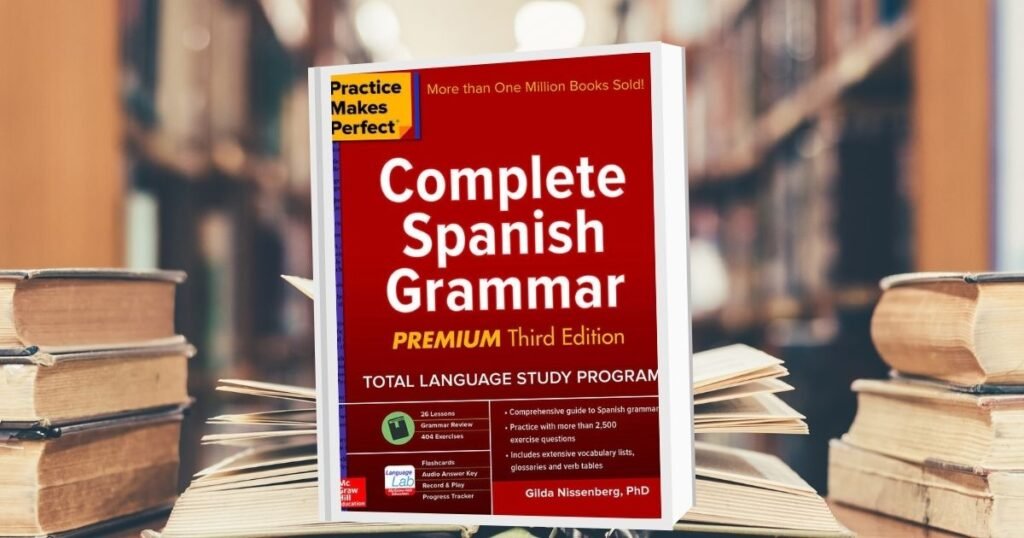
This mix between a textbook and a workbook isn’t a specialized book for DELE. However, if you truly want to triumph at DELE, you need to use a mix of both!
Practice makes Perfect is a fantastic series of books that doesn’t include just grammar, but also vocabulary, conversation, etc. We recommend you focus on this one for you DELE exam, since it’s an overview of Spanish grammar with practical exercises included.
The name of the series couldn’t be more fitting: practice really does make perfect!
We hope you’ve found these tips useful and that you feel more determined to undertake the mission of obtaining your diploma.
All things considered, DELE is an incredibly useful diploma in all of the Spanish speaking world. It doesn’t only look good on your CV, it also opens many doors for you.
Another thing that every Spanish student should know, especially if you’re taking DELE, is what Instituto Cervantes is and what’s their goal. It’s not just a center where you take the exam, it’s an institution with broad specter of activities dedicated to the love of Spanish all things Spanish.
If you truly want to triumph at DELE, you will need to assess your level first. Also take into account your location and your options and then choose the best course/teacher/books to help you prepare.
And if you’re taking a preparatory course, don’t forget to keep studying Spanish as you usually would. Preparatory courses and books will only take you so far, so read as much as you can, solidify your grammar and expand your vocabulary.
FINAL WORD
We’re also aware that sometimes the hardest thing is knowing where to even begin the whole process, so we’ve got that covered for you too. The obvious place to look would be the Instituto Cervantes. However, the website can be a little bit difficult to navigate, especially for beginners.
Always remember that the real work starts before the exam itself, so make sure you got the administration out of the way first.
¡Mucha suerte!
